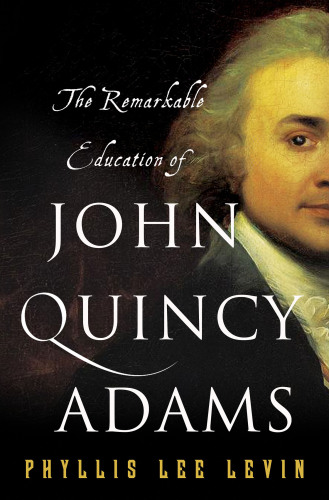
The Remarkable Education of John Quincy Adams
کتاب های مرتبط
- اطلاعات
- نقد و بررسی
- دیدگاه کاربران
نقد و بررسی

October 20, 2014
Few men in the nation’s history achieved as much or brought to his many offices the capacity of mind of John Quincy Adams. His life and achievements are worth revisiting, and this smoothly-written book from Levin (Abigail Adams) gets us part way. It’s a half-biography that abruptly stops in 1815, though why that year—or before or later—isn’t entirely clear. Adams’s formal education ended much earlier, and one’s education, we like to think, continues through life—in his case until his 1848 death. Also, while wisely using the expansive Adams family papers to bring her subject to life, Levin overlooks all but a very few books in the vast, serious literature about Adams, his times, and the context of the issues he addressed. The text is also clotted with unnecessary details, such as at what hour Adams arose and the Washington address at which he lodged before being sworn in as U.S. senator. Yet aside from these significant lapses, it’s also balanced, compelling, and wise. Levin brings Louisa Catherine Adams, Adams’s troubled wife, into the center of the picture, where she belongs, and the author is shrewd about family dynamics. A solid if flawed work.

November 1, 2014
The formative experiences that shaped a political mind.John Quincy Adams (1767-1848) began keeping a diary when he was 11 years old, a project that resulted in tens of thousands of pages. To produce this perceptive biography, Levin (Edith and Woodrow: The Wilson White House, 2001, etc.) has judiciously mined that abundant material, along with Adams' prolific correspondence and his wife's memoirs. Although considered by contemporaries "a frigid and icy New Englander," Adams, as the author portrays him, was a passionate man, often lonely, self-critical and exacting of others (Thomas Jefferson, for one, who seemed to Adams shifty and calculating). Besides revealing his emotions and intellectual growth, his diary offers a vivid record of the tumultuous political events that he witnessed, including the American Revolution, Louisiana Purchase and Napoleon's doomed invasion of Russia. Adams made his first trip to Europe in 1778, as his father's companion and secretary, and at age 14, he accompanied Ambassador Francis Dana to Russia, interpreting peace negotiations conducted in French. By the time Adams enrolled at Harvard, he was a worldly young man but had no clear direction. Following his father's advice, he began a legal apprenticeship in the small town of Newburyport, where, isolated and anxious about his future, he plummeted into overwhelming depression-an affliction that would recur throughout his life. His parents, the estimable John and Abigail, had high hopes for their son. If he achieved anything less than professional prominence, they told him, "it will be owing to your own laziness, slovenliness, and obstinacy." As a minister to The Hague, London, Prussia and Russia, senator from Massachusetts, secretary of state under James Monroe and professor of rhetoric at Harvard, Adams had no lack of achievement and honors. Levin focuses on his education-as a lawyer, statesman, husband and father-ending in 1815, with major roles yet before him.An intimate, richly detailed portrait of a powerful political figure.
COPYRIGHT(2014) Kirkus Reviews, ALL RIGHTS RESERVED.

December 1, 2014
Former New York Times journalist Levin (Edith and Woodrow) offers a richly detailed biography of sixth U.S. president John Quincy Adams's youth and early political career, focusing on his extensive European boyhood travels with his father, second U.S. president John Adams, as well as his wide-ranging diplomatic duties prior to becoming James Monroe's secretary of state in 1817. Relying heavily on Adams's journal and especially his letters to family members and colleagues, Levin crafts an intimate portrait of a bookish, devoted young patriot who struggled to balance filial duties to doting parents, a troubled marriage to a wife whose own writings reveal her inner turmoil, and an ambitious career that entailed trying to forge peaceful relations with European powers as his young nation's official representative to the Netherlands, England, Russia, and elsewhere. Long, well-chosen diary excerpts and correspondence reveal how Adams's early travels helped shape his political views while preparing him well for his own tours as ambassador. VERDICT This hefty yet absorbing work distinguishes itself from recent studies, such as Fred Kaplan's John Quincy Adams: American Visionary by focusing solely on its subject's first four decades of life and is recommended to academic readers interested in Adams's upbringing or American diplomatic history.--Douglas King, Univ. of South Carolina Lib., Columbia
Copyright 2014 Library Journal, LLC Used with permission.

December 15, 2014
John Quincy Adams was seemingly the best prepared man to ever assume the presidency. Yet, like his father, he was a one-term president whose administration was filled with more disappointments than achievements. Levin, an author and journalist, follows the life of Adams from childhood to his appointment as secretary of state by President James Monroe in 1817. This is an abruptly and oddly truncated biography since some of the most interesting and controversial aspects of his public life lay just ahead. Still, relying on Adams' voluminous diary, his letters, and the memoirs of his wife, Levin offers wonderful insights into his career and character. Groomed and pressured by his parents to excel in public service, Adams accompanied and assisted his father as the elder Adams served in diplomatic posts in Europe. On his own, he served as a U.S. senator and as an ambassador to the Netherlands, Russia, and, finally, Great Britain. His observations and counsel as Europe suffered under the Napoleonic Wars were invaluable. The sources also reveal both his brilliance and the inflexibility that would plague his efforts to succeed in domestic politics. This is an excellent examination of a portion of the life and public career of a true icon in U.S. diplomatic history.(Reprinted with permission of Booklist, copyright 2014, American Library Association.)

























دیدگاه کاربران